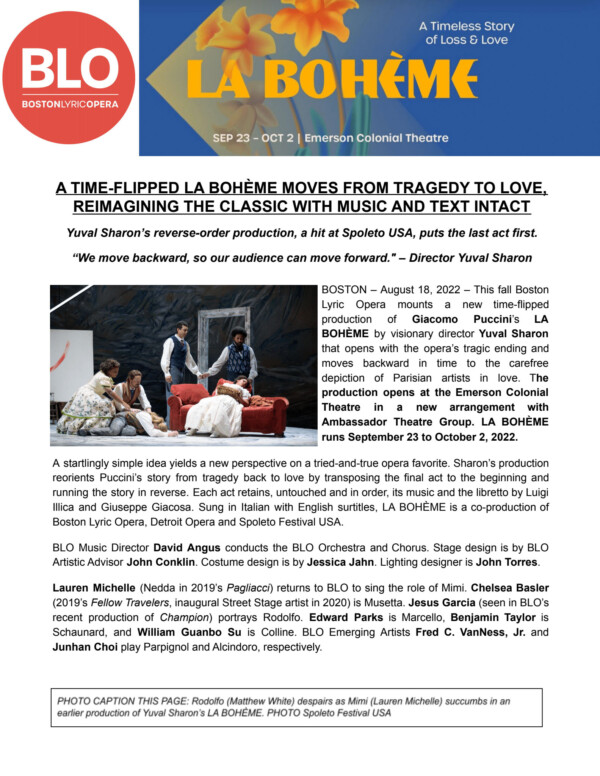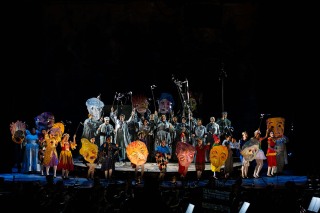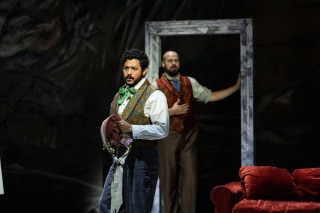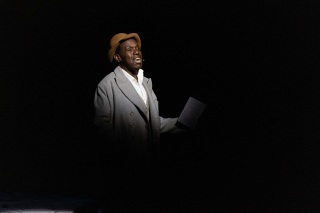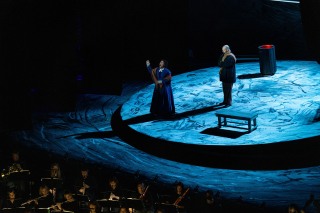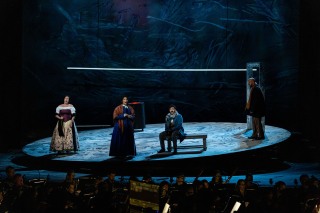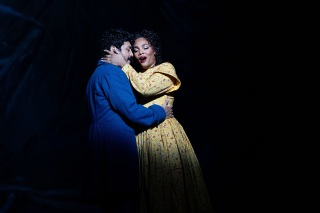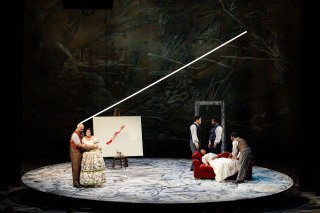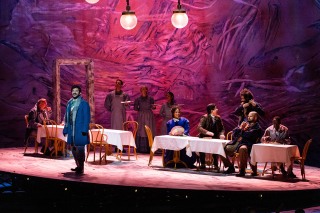La bohème
Composer Giacomo Puccini
Librettists Luigi Illica & Giuseppe Giacosa
Emerson Colonial Theatre
September 23 – October 2, 2022
How does a group of young artists go from tragedy to hope? From death to life? From loneliness to love? In this visionary treatment of Puccini’s masterpiece La bohème, BLO does just that — by presenting the opera in reverse order. From finish to start, from death to the promise of new love, from loneliness and despair to the joy of friendships, wine, and song, this reversal presents the characters and arias we love in a refreshing, new vision of the story. Our favorite starving young artists and lovers survive to live another day.
A co-production of Boston Lyric Opera, Detroit Opera, and Spoleto Festival, USA.
David Angus is sponsored this season by Linda Cabot Black.
This production of La bohème is supported in part by an award from the National Endowment for the Arts.
Hear what people are saying about this new production –
“See this Bohème!”
“An engrossing perspective shift! Boston Lyric Opera…cast(s) new light on an old warhorse.”
“The cast made a stellar showing…It was impossible not to fall in love with Mimì — a truly luminous Lauren Michelle.”
-The Boston Globe
“a production of decisive moments…makes Puccini’s tragedy more about the why than the what of it all.”
– The New York Times
“The story becomes one of swift, fleeting youth, the bareness of the characters’ physical lives contrasted with the richness of their dreams. We also leave the performance with the memory of hope and promise, rather than the story’s sad conclusion.”
– The Wall Street Journal
“Whether you’re a veteran opera-goer or just opera-curious, this is the show to see… stands alone as thrilling entertainment!”
– New England Theater Mirror
“From a musical standpoint, BLOs rendition was top-notch… It is always a pleasure to hear Puccini’s sublimely lyrical score.“
–Edge Media
“Triumphant, fresh and touching! Boston Lyric Opera’s excellent and unorthodox staging of “La Bohème” is sure to please even the most staunch opera purists.“
– The Harvard Crimson
Hear from Yuval Sharon
First Watch
Sneak Peak

Lauren Michelle
Mimi
Lauren Michelle | Mimi
 Soprano Lauren Michelle is an internationally recognized opera singer. Some of her notable international roles include Susanna in Le Nozze di Figaro, Musetta in La bohème, Helena in A Midsummer Night’s Dream, and Lauretta in Gianni Schicchi. She has performed at Covent Garden, Vienna State Opera, La Scala Theatre, Carnegie Hall and more. She sang in concert under the baton of Plácido Domingo at LA Opera and made her debut with Washington National Opera to critical acclaim alongside Eric Owens. She was a prize winner of the BBC Cardiff Singer of the World Competition and has been awarded First in both the Lotte Lenya Competition and the Marcello Giordani International Vocal Competition. She is a graduate of UCLA and The Juilliard School.
Soprano Lauren Michelle is an internationally recognized opera singer. Some of her notable international roles include Susanna in Le Nozze di Figaro, Musetta in La bohème, Helena in A Midsummer Night’s Dream, and Lauretta in Gianni Schicchi. She has performed at Covent Garden, Vienna State Opera, La Scala Theatre, Carnegie Hall and more. She sang in concert under the baton of Plácido Domingo at LA Opera and made her debut with Washington National Opera to critical acclaim alongside Eric Owens. She was a prize winner of the BBC Cardiff Singer of the World Competition and has been awarded First in both the Lotte Lenya Competition and the Marcello Giordani International Vocal Competition. She is a graduate of UCLA and The Juilliard School.
Jesus Garcia
Rodolfo
Jesus Garcia | Rodolfo
 Acclaimed tenor Jesus Garcia specializes in romantic roles of the French and Italian repertoires. His best known performances include a debut in the title role of Charles Gounod’s Faust at the Savonlinna Opera Festival, La bohème with Tampere Talo in Finland, and as Count Almaviva in Rosetta Cucchi’s Boston Lyric Opera production of Il Barbiere di Siviglia. Garcia has performed in W.A. Mozart’s Requiem throughout Italy with Filharmonia Arturo Toscanini, conducted by Rinaldo Alessandrini. His recordings include the world premiere of Jorge Martin’s Before Night Falls, the Original Broadway Cast recording of Baz Luhrmann’s La bohème, and Laurent Pelly’s production of La Vie Parisienne. As part of the principal ensemble of Luhrmann’s La bohème, in which he played Rodolfo, Garcia received a 2003 Tony Honor for Excellence in the Theater. He has been seen on NBC’s Today Show, A&E’s Breakfast with the Arts, and the Tony Awards broadcast, has been featured in The New York Times, Vogue, Vanity Fair, New York and Opera News.
Acclaimed tenor Jesus Garcia specializes in romantic roles of the French and Italian repertoires. His best known performances include a debut in the title role of Charles Gounod’s Faust at the Savonlinna Opera Festival, La bohème with Tampere Talo in Finland, and as Count Almaviva in Rosetta Cucchi’s Boston Lyric Opera production of Il Barbiere di Siviglia. Garcia has performed in W.A. Mozart’s Requiem throughout Italy with Filharmonia Arturo Toscanini, conducted by Rinaldo Alessandrini. His recordings include the world premiere of Jorge Martin’s Before Night Falls, the Original Broadway Cast recording of Baz Luhrmann’s La bohème, and Laurent Pelly’s production of La Vie Parisienne. As part of the principal ensemble of Luhrmann’s La bohème, in which he played Rodolfo, Garcia received a 2003 Tony Honor for Excellence in the Theater. He has been seen on NBC’s Today Show, A&E’s Breakfast with the Arts, and the Tony Awards broadcast, has been featured in The New York Times, Vogue, Vanity Fair, New York and Opera News.
Edward Parks
Marcello
Edward Parks | Marcello
 Recipient of a 2019 GRAMMY award, baritone Edward Parks has been hailed by Opera News for his “warm, velvety baritone” and the New York Times for providing “precision, sensitivity and nuance in abundance” and a “robust, earthy voice”. He was awarded third prize in Placido Domingo’s 2015 Operalia Competition and was presented in the organization’s “The Voices of 2015” concert in Hungary. Mr. Parks begins the 2022-2023 season with performances of Marcello in La bohème with Boston Lyric Opera, followed by performances of the title role in a new production of Peter Knell and Stephanie Fleischmann’s Arkhipov. He also reprises Jack Torrance in The Shining with Lyric Opera of Kansas City and Opera Parallele. In the 2021-2022 season Mr. Parks joined Andrea Bocelli on national tour, performing in dozens of venues including New York City’s Madison Square Garden. Also in 2022, he reprised Jack Torrance in The Shining with Opera Colorado and brought his Marcello in La bohème to Detroit Opera (formerly Michigan Opera Theater). A graduate of the Metropolitan Opera’s Lindemann Young Artists Development Program, Mr. Parks made his Metropolitan Opera debut in the 2009-2010 season as Fiorello in Il barbiere di Siviglia and has since appeared as Schaunard in La bohème and as Larkens in La fancuilla del West, which was broadcast in HD around the world.
Recipient of a 2019 GRAMMY award, baritone Edward Parks has been hailed by Opera News for his “warm, velvety baritone” and the New York Times for providing “precision, sensitivity and nuance in abundance” and a “robust, earthy voice”. He was awarded third prize in Placido Domingo’s 2015 Operalia Competition and was presented in the organization’s “The Voices of 2015” concert in Hungary. Mr. Parks begins the 2022-2023 season with performances of Marcello in La bohème with Boston Lyric Opera, followed by performances of the title role in a new production of Peter Knell and Stephanie Fleischmann’s Arkhipov. He also reprises Jack Torrance in The Shining with Lyric Opera of Kansas City and Opera Parallele. In the 2021-2022 season Mr. Parks joined Andrea Bocelli on national tour, performing in dozens of venues including New York City’s Madison Square Garden. Also in 2022, he reprised Jack Torrance in The Shining with Opera Colorado and brought his Marcello in La bohème to Detroit Opera (formerly Michigan Opera Theater). A graduate of the Metropolitan Opera’s Lindemann Young Artists Development Program, Mr. Parks made his Metropolitan Opera debut in the 2009-2010 season as Fiorello in Il barbiere di Siviglia and has since appeared as Schaunard in La bohème and as Larkens in La fancuilla del West, which was broadcast in HD around the world.
Chelsea Basler
Musetta
Chelsea Basler | Musetta
 Grammy Award-nominated soprano Chelsea Basler continues to make her mark in an extensive array of operatic roles due to her unique combination of vocal appeal and artistry. Praised for her “luminous voice” with its “easy soaring range,” she has also been noted for her “wonderful acting” and ultimately deemed “simply superb.” During the 2020-21 season, Ms. Basler was scheduled to return to the Metropolitan Opera to cover Micaëla in Carmen (COVID-19), perform the role of Julia Lowell in Borzoni’s The Copper Queen with Arizona Opera (COVID-19), perform with Emmanuel Music as Angela in Weill’s Firebrand of Florence (COVID-19), and perform as the soprano soloist in Beethoven’s Ninth Symphony with Cape Symphony (COVID-19 – postponed until 2022). In the summer of 2020, she was proud to be part of Boston Lyric Opera’s virtual performance of The Fall of the House of Usher, singing the role of Madeline. In the summer of 2021, she returned to the Newport Music Festival for a recital and in the fall of 2021, she returned to Boston Lyric Opera as Lola in Cavalleria rusticana and the Providence Singers for Brahms’ Requiem. During the 2022-2023 season, Ms. Basler will return to the Metropolitan Opera, covering Blanche in Dialogues des Carmélites and singing Musetta in La bohème at Boston Lyric Opera.
Grammy Award-nominated soprano Chelsea Basler continues to make her mark in an extensive array of operatic roles due to her unique combination of vocal appeal and artistry. Praised for her “luminous voice” with its “easy soaring range,” she has also been noted for her “wonderful acting” and ultimately deemed “simply superb.” During the 2020-21 season, Ms. Basler was scheduled to return to the Metropolitan Opera to cover Micaëla in Carmen (COVID-19), perform the role of Julia Lowell in Borzoni’s The Copper Queen with Arizona Opera (COVID-19), perform with Emmanuel Music as Angela in Weill’s Firebrand of Florence (COVID-19), and perform as the soprano soloist in Beethoven’s Ninth Symphony with Cape Symphony (COVID-19 – postponed until 2022). In the summer of 2020, she was proud to be part of Boston Lyric Opera’s virtual performance of The Fall of the House of Usher, singing the role of Madeline. In the summer of 2021, she returned to the Newport Music Festival for a recital and in the fall of 2021, she returned to Boston Lyric Opera as Lola in Cavalleria rusticana and the Providence Singers for Brahms’ Requiem. During the 2022-2023 season, Ms. Basler will return to the Metropolitan Opera, covering Blanche in Dialogues des Carmélites and singing Musetta in La bohème at Boston Lyric Opera.
Junhan Choi
Alcindoro
Junhan Choi | Alcindoro
 Praised for his “splendid baritone voice, rich and rounded”, baritone Junhan Choi, a native of South Korea, is an active opera, oratorio and concert singer. In the 2022-2023 season, engagements included his role Grégorio in Roméo et Juliette, role Alcindoro and Schaunard(cover) in La boheme with Boston Lyric Opera, baritone soloist in Fractured Mosaics with White Snake Projects, role Dad/Doctor/One in Her Alive[un]dead with Guerilla Opera, and role Adonis in Venus and Adonis with Cambridge Chamber Ensemble. He is also engaged as baritone soloist for Duruflé’s Requiem with Naples Philharmonic, BWV 140 and Hyden’s Lord Nelson Mass with Commonwealth Chorale, and Bach’s Mass in B minor with Upper Valley Baroque. Mr. Choi is a prize winner in many international competitions, such as the 54th Viñas International Voice Competition (Spain/Three Extraordinary Prizes – Mercedes Viñas, Victoria de los Ángeles, Franz Schubert), the Berliner International Music Competition (Germany/Golden Medal), Talents of the World International Voice Competition (1st Place), MassOpera’s Vocal Competition (1st Place), Rochester International Vocal Competition (4th Place and Audience Favorite) and St. Botolph Emergi ng Artist Grant for excellence in music. He holds a Master’s degree and a Graduate Diploma with a Presidential Scholarship from New England Conservatory of Music.
Praised for his “splendid baritone voice, rich and rounded”, baritone Junhan Choi, a native of South Korea, is an active opera, oratorio and concert singer. In the 2022-2023 season, engagements included his role Grégorio in Roméo et Juliette, role Alcindoro and Schaunard(cover) in La boheme with Boston Lyric Opera, baritone soloist in Fractured Mosaics with White Snake Projects, role Dad/Doctor/One in Her Alive[un]dead with Guerilla Opera, and role Adonis in Venus and Adonis with Cambridge Chamber Ensemble. He is also engaged as baritone soloist for Duruflé’s Requiem with Naples Philharmonic, BWV 140 and Hyden’s Lord Nelson Mass with Commonwealth Chorale, and Bach’s Mass in B minor with Upper Valley Baroque. Mr. Choi is a prize winner in many international competitions, such as the 54th Viñas International Voice Competition (Spain/Three Extraordinary Prizes – Mercedes Viñas, Victoria de los Ángeles, Franz Schubert), the Berliner International Music Competition (Germany/Golden Medal), Talents of the World International Voice Competition (1st Place), MassOpera’s Vocal Competition (1st Place), Rochester International Vocal Competition (4th Place and Audience Favorite) and St. Botolph Emergi ng Artist Grant for excellence in music. He holds a Master’s degree and a Graduate Diploma with a Presidential Scholarship from New England Conservatory of Music.
Fred C. VanNess Jr.
Parpignol
Fred C. VanNess Jr. | Parpignol
 Tenor Fred C. VanNess, Jr. performs a wide variety of repertoire on stages across New England. Mr. VanNess has appeared as Russell Davenport in the acclaimed new opera Freedom Ride (Shore) presented in a co-production by MASSOpera and Chicago Opera Theater, Voltaire/Dr. Pangloss in Candide (Bernstein), Don Ottavio in Don Giovanni (Mozart), Don José in Carmen (Bizet), and Rodolfo in La bohème (Puccini). An avid concert performer, Mr. VanNess is a member of Castle of our Skins, an organization dedicated to celebrating Black artistry through music. He has also been featured in solo recitals with Lake Charles Symphony, Salem Philharmonic, and Coushatta Casino Resort. Mr. VanNess has developed and performed a one-man show, showcasing some of his favorite music alongside his unique point of view as an artist. His most recent show, When I Think of Home…, premiered at McNeese State University in Lake Charles, Louisiana. Mr. VanNess holds degrees from The Longy School of Music of Bard College, Louisiana State University, and McNeese State University.
Tenor Fred C. VanNess, Jr. performs a wide variety of repertoire on stages across New England. Mr. VanNess has appeared as Russell Davenport in the acclaimed new opera Freedom Ride (Shore) presented in a co-production by MASSOpera and Chicago Opera Theater, Voltaire/Dr. Pangloss in Candide (Bernstein), Don Ottavio in Don Giovanni (Mozart), Don José in Carmen (Bizet), and Rodolfo in La bohème (Puccini). An avid concert performer, Mr. VanNess is a member of Castle of our Skins, an organization dedicated to celebrating Black artistry through music. He has also been featured in solo recitals with Lake Charles Symphony, Salem Philharmonic, and Coushatta Casino Resort. Mr. VanNess has developed and performed a one-man show, showcasing some of his favorite music alongside his unique point of view as an artist. His most recent show, When I Think of Home…, premiered at McNeese State University in Lake Charles, Louisiana. Mr. VanNess holds degrees from The Longy School of Music of Bard College, Louisiana State University, and McNeese State University.
Benjamin Taylor
Schaunard
Benjamin Taylor | Schaunard
 Baritone Benjamin Taylor began the 21/22 season with debuts at The Metropolitan Opera in Fire Shut Up in My Bones (Chester), Michigan Opera Theatre and Spoleto Festival USA in La bohème (Schaunard), Cincinnati Opera for the world premiere of Castor and Patience (West), North Carolina Opera for Sanctuary Road (William Still), and Baltimore Concert Opera for Adriana Lecouvreur (Michonnet), and a return to Pittsburgh Opera for The Magic Flute (Papageno). Additionally, he will workshop Factotum (Garby) at the Lyric Opera of Chicago. Last season included his return to Opera Theatre of Saint Louis for Opera on the Go – Digital followed by debuts with Fargo-Moorhead Opera for Il barbiere di Siviglia (Figaro), Opera Orlando for The Secret River (Augustus), and Des Moines Metro Opera for Pique Dame (Tomsky), Platée (Satyre), and Fellow Travelers (Tommy McIntyre). Mr. Taylor is a graduate of the Pittsburgh Opera Resident Artist Program and was previously an Apprentice Artist at The Santa Fe Opera, and Gerdine Young Artist and Richard Gaddes Festival Artist at Opera Theatre of Saint Louis. Benjamin received his Master of Music from Boston University and his Performer’s Certificate with Boston University’s Opera Institute, and his Bachelor of the Arts at Morgan State University.
Baritone Benjamin Taylor began the 21/22 season with debuts at The Metropolitan Opera in Fire Shut Up in My Bones (Chester), Michigan Opera Theatre and Spoleto Festival USA in La bohème (Schaunard), Cincinnati Opera for the world premiere of Castor and Patience (West), North Carolina Opera for Sanctuary Road (William Still), and Baltimore Concert Opera for Adriana Lecouvreur (Michonnet), and a return to Pittsburgh Opera for The Magic Flute (Papageno). Additionally, he will workshop Factotum (Garby) at the Lyric Opera of Chicago. Last season included his return to Opera Theatre of Saint Louis for Opera on the Go – Digital followed by debuts with Fargo-Moorhead Opera for Il barbiere di Siviglia (Figaro), Opera Orlando for The Secret River (Augustus), and Des Moines Metro Opera for Pique Dame (Tomsky), Platée (Satyre), and Fellow Travelers (Tommy McIntyre). Mr. Taylor is a graduate of the Pittsburgh Opera Resident Artist Program and was previously an Apprentice Artist at The Santa Fe Opera, and Gerdine Young Artist and Richard Gaddes Festival Artist at Opera Theatre of Saint Louis. Benjamin received his Master of Music from Boston University and his Performer’s Certificate with Boston University’s Opera Institute, and his Bachelor of the Arts at Morgan State University.
William Guanbo Su
Colline
William Guanbo Su | Colline
 William Guanbo Su is a 2019 Metropolitan Opera National Council Auditions Grand Finals winner.
William Guanbo Su is a 2019 Metropolitan Opera National Council Auditions Grand Finals winner.In the 2022-23 season, he will return to the Metropolitan Opera stage as the Speaker in The Magic Flute, Austin Opera for Basilio in Il barbiere di Siviglia, and Houston Grand Opera for the First Nazarene in Salome. He also returns to the Opera Theatre of Saint Louis for another role debut. This season he completes his final year as a member of the Houston Grand Opera Studio in which he sings Zuniga in Carmen, First Officer in Dialogues des Carmélites, Second Armed Man in Die Zauberflöte, and Duke of Verona in Roméo et Juliette. Also in the 2021-22 season, he makes his Metropolitan Opera debut as the Jailer in Tosca. This summer he will be a member of the Académie Vocal Residence at the Festival d’Aix-en-Provence. Previously with Houston Grand Opera, he sang the Usher in Rigoletto as well as a digital performances of Schumann’s Liederkreis Op. 39. Other recent performances include Angelotti and the Jailer in Tosca (Austin Opera); Basilio in Il barbiere di Siviglia, Sarastro in Die Zauberflöte, and Garibaldo in Rodelinda (Aspen Music Festival); and Count Ceprano in Rigoletto (Opera Theatre of Saint Louis). He has joined the Cecilia Chorus of New York singing Bach’s Christmas Oratorio and Handel’s Messiah.

Marshall Hughes
The Wanderer
Marshall Hughes | The Wanderer
 Marshall Hughes is founder and director of Opera unMet, an urban opera company which has performed in major venues over the past decades, including the Hatch Shell, Symphony Hall, and First Night. Marshall conducted SANS, an International Choral Exchange Choir, for over fifteen years, conducting in the former Soviet Union, Russia, The Balkans and China. He has performed extensively in the United States and internationally, and has directed major theater productions at colleges, including Emerson College, New England Conservatory of Music, Boston Conservatory of Music, and Wheelock College. He has been on the faculties of several colleges teaching theater, music and dance, including MIT, Wheelock, Roxbury Community College, Boston and New England Conservatories, and Emmanuel College. He has numerous awards for his critically acclaimed work with Roxbury Repertory Theater, including the Kenneth A. MacDonald Award for Theater Excellence, (A Soldiers Play, Alice, Othello). He was most recently seen on stage at A.R.T., Arts Emerson, Sleeping Weazel, and with unMet in Arias On The Steps on the green at UUUM in Roxbury MA.
Marshall Hughes is founder and director of Opera unMet, an urban opera company which has performed in major venues over the past decades, including the Hatch Shell, Symphony Hall, and First Night. Marshall conducted SANS, an International Choral Exchange Choir, for over fifteen years, conducting in the former Soviet Union, Russia, The Balkans and China. He has performed extensively in the United States and internationally, and has directed major theater productions at colleges, including Emerson College, New England Conservatory of Music, Boston Conservatory of Music, and Wheelock College. He has been on the faculties of several colleges teaching theater, music and dance, including MIT, Wheelock, Roxbury Community College, Boston and New England Conservatories, and Emmanuel College. He has numerous awards for his critically acclaimed work with Roxbury Repertory Theater, including the Kenneth A. MacDonald Award for Theater Excellence, (A Soldiers Play, Alice, Othello). He was most recently seen on stage at A.R.T., Arts Emerson, Sleeping Weazel, and with unMet in Arias On The Steps on the green at UUUM in Roxbury MA.
David Angus
Conductor
David Angus | Conductor
 Now in his tenth year as Boston Lyric Opera’s Music Director, David Angus recently navigated new and innovative concepts of presenting opera online, serving as Music Director and conductor for the critically-acclaimed productions of desert in and The Fall of the House of Usher.
Now in his tenth year as Boston Lyric Opera’s Music Director, David Angus recently navigated new and innovative concepts of presenting opera online, serving as Music Director and conductor for the critically-acclaimed productions of desert in and The Fall of the House of Usher.
Yuval Sharon
Director
Yuval Sharon | Director
 On September 9, 2020, Yuval Sharon was named the Gary L. Wasserman Artistic Director at the Detroit Opera. Described by The New York Times as “opera’s disrupter in residence,” director Yuval Sharon has been creating an unconventional body of work that seeks to expand the operatic form. During the 2021-22 season—his first full season as Artistic Director—Sharon leads new productions of Ragnar Kjartansson’s Bliss, staged in the historic Michigan Building Theatre, and La bohème, presented in reverse order in the Detroit Opera House. Yuval founded and serves as Artistic Director of The Industry in Los Angeles, a company devoted to new and experimental opera that has brought opera into moving vehicles, operating train stations, Hollywood sound stages, and various “non-spaces” such as warehouses, parking lots, and escalator corridors. From 2016-2019, Sharon was the first Artist-in-Residence at the Los Angeles Philharmonic, creating nine projects and was honored with a 2017 MacArthur Fellowship and a Foundation for Contemporary Art grant for theater.”
On September 9, 2020, Yuval Sharon was named the Gary L. Wasserman Artistic Director at the Detroit Opera. Described by The New York Times as “opera’s disrupter in residence,” director Yuval Sharon has been creating an unconventional body of work that seeks to expand the operatic form. During the 2021-22 season—his first full season as Artistic Director—Sharon leads new productions of Ragnar Kjartansson’s Bliss, staged in the historic Michigan Building Theatre, and La bohème, presented in reverse order in the Detroit Opera House. Yuval founded and serves as Artistic Director of The Industry in Los Angeles, a company devoted to new and experimental opera that has brought opera into moving vehicles, operating train stations, Hollywood sound stages, and various “non-spaces” such as warehouses, parking lots, and escalator corridors. From 2016-2019, Sharon was the first Artist-in-Residence at the Los Angeles Philharmonic, creating nine projects and was honored with a 2017 MacArthur Fellowship and a Foundation for Contemporary Art grant for theater.”
James Blaszko
Revival Director
James Blaszko | Revival Director
 A first-generation American raised in a Polish-Pakistani household, James Blaszko’s (he/him) varied education in arts and culture began at an early age and has translated into diverse collaborations across the globe. Before the pandemic, Blaszko staged Puccini’s Il Trittico at Daegu Opera House (South Korea), the opening ceremony of the Harare International Festival of the Arts (Zimbabwe), and Britten’s Les Illuminations with selections of Debussy and Patti Smith at Bay Chamber Concerts (Rockport, ME). He returned to live performance in 2021 by devising and staging Puccini and Verdi Play Ball with Tulsa Opera on their city’s baseball stadium. Blaszko’s collaborations with Cuban filmmaker Adolfo Mena Cejas include Tell The Story, a documentary for John Doyle’s Classic Stage Company about the seminal New York productions of Sondheim’s Assassins over the past 30 years, and Zenon, which was selected by the New Haven Documentary Film Festival in 2020. His next digital work, a commission from Catapult Opera with composer Tamar-kali and writer Carl Hancock Rux, will premiere in late 2022. Blaszko is currently Tour Producer of The Peculiar Patriot by Liza Jessie Peterson, which will be next presented at Detroit Public Theater in 2023. He is also Creative Director of @beccahbogue on Instagram, a multimedia project promoting the forthcoming memoir of disabled dancer Rebeccah Bogue.
A first-generation American raised in a Polish-Pakistani household, James Blaszko’s (he/him) varied education in arts and culture began at an early age and has translated into diverse collaborations across the globe. Before the pandemic, Blaszko staged Puccini’s Il Trittico at Daegu Opera House (South Korea), the opening ceremony of the Harare International Festival of the Arts (Zimbabwe), and Britten’s Les Illuminations with selections of Debussy and Patti Smith at Bay Chamber Concerts (Rockport, ME). He returned to live performance in 2021 by devising and staging Puccini and Verdi Play Ball with Tulsa Opera on their city’s baseball stadium. Blaszko’s collaborations with Cuban filmmaker Adolfo Mena Cejas include Tell The Story, a documentary for John Doyle’s Classic Stage Company about the seminal New York productions of Sondheim’s Assassins over the past 30 years, and Zenon, which was selected by the New Haven Documentary Film Festival in 2020. His next digital work, a commission from Catapult Opera with composer Tamar-kali and writer Carl Hancock Rux, will premiere in late 2022. Blaszko is currently Tour Producer of The Peculiar Patriot by Liza Jessie Peterson, which will be next presented at Detroit Public Theater in 2023. He is also Creative Director of @beccahbogue on Instagram, a multimedia project promoting the forthcoming memoir of disabled dancer Rebeccah Bogue.
John Conklin
Set Designer
John Conklin | Set Designer
 John Conklin has designed for the Metropolitan Opera, Lyric Opera of Chicago, San Francisco Opera, Santa Fe Opera, Opera Theater of St Louis, Glimmerglass Opera and the opera companies of Houston, Seattle, Dallas, Washington and Minneapolis, among others. Abroad he has worked at the English National Opera, the Bayerische Staatsoper, and The Australian Opera. In addition, he served as Director of Production for New York City Opera, Associate Director of Glimmerglass Opera, and he is currently Artistic Advisor to Boston Lyric Opera. He recently retired from teaching at the Tisch School of the Arts at NYU.
John Conklin has designed for the Metropolitan Opera, Lyric Opera of Chicago, San Francisco Opera, Santa Fe Opera, Opera Theater of St Louis, Glimmerglass Opera and the opera companies of Houston, Seattle, Dallas, Washington and Minneapolis, among others. Abroad he has worked at the English National Opera, the Bayerische Staatsoper, and The Australian Opera. In addition, he served as Director of Production for New York City Opera, Associate Director of Glimmerglass Opera, and he is currently Artistic Advisor to Boston Lyric Opera. He recently retired from teaching at the Tisch School of the Arts at NYU.
Jessica Jahn
Costume Designer
Jessica Jahn | Costume Designer
 Off-Broadway: Coal Country, (The Public Theatre); Gloria: A Life, (Daryl Roth Theatre); Die Mommie Die! (New World Stages); Monodramas (New York City Opera). Regional: American Repertory Theater, McCarter Theater, Kennedy Center, Lyric Opera of Chicago, San Francisco Opera, Houston Grand Opera. International: The Gran Teatre de Liceu, Wexford Opera. Upcoming: Orfeo ed Euridice (San Francisco Opera). Jessica is currently a member of the steering committees of Opera America’s Women’s Opera Network (WON) and Racial Justice Opera Network (RJON), as well as Opera America Board’s Membership Committee.
Off-Broadway: Coal Country, (The Public Theatre); Gloria: A Life, (Daryl Roth Theatre); Die Mommie Die! (New World Stages); Monodramas (New York City Opera). Regional: American Repertory Theater, McCarter Theater, Kennedy Center, Lyric Opera of Chicago, San Francisco Opera, Houston Grand Opera. International: The Gran Teatre de Liceu, Wexford Opera. Upcoming: Orfeo ed Euridice (San Francisco Opera). Jessica is currently a member of the steering committees of Opera America’s Women’s Opera Network (WON) and Racial Justice Opera Network (RJON), as well as Opera America Board’s Membership Committee.
John Torres
Lighting Designer
John Torres | Lighting Designer
 John Torres is a New York-based lighting designer working in theater, dance, motion, and print. Recent opera projects have included: Turandot (Opera Bastille, Paris), Tristan und Isolde (La Monnaie, Brussels), ATLAS, directed by Yuval Sharon (Disney Hall, LA Philharmonic), Eden with Joyce DiDonato (Bozar, Brussels), Der Messias with Robert Wilson (Salzburg Festival). Theater: Twelfth Night, A Bright Room Called Day (The Public, NYC), The Black Clown (A.R.T. Cambridge), Only an Octave Apart, Hamlet (St. Ann’s Warehouse, Brooklyn), Assembly (Park Avenue Armory). TV: Tony Bennett & Lady Gaga: Cheek to Cheek Live!, Joni 75 (PBS). Music: Taylor Mac: A 24 Decade… (St. Ann’s Warehouse), Solange Knowles, Florence and the Machine, and Usher: The Vegas Residency. Dance: Available Light, Lucinda Childs (Théâtre de La Ville, Paris), Lost Mountain, Bobbi Jene Smith (La Mama, NYC).
John Torres is a New York-based lighting designer working in theater, dance, motion, and print. Recent opera projects have included: Turandot (Opera Bastille, Paris), Tristan und Isolde (La Monnaie, Brussels), ATLAS, directed by Yuval Sharon (Disney Hall, LA Philharmonic), Eden with Joyce DiDonato (Bozar, Brussels), Der Messias with Robert Wilson (Salzburg Festival). Theater: Twelfth Night, A Bright Room Called Day (The Public, NYC), The Black Clown (A.R.T. Cambridge), Only an Octave Apart, Hamlet (St. Ann’s Warehouse, Brooklyn), Assembly (Park Avenue Armory). TV: Tony Bennett & Lady Gaga: Cheek to Cheek Live!, Joni 75 (PBS). Music: Taylor Mac: A 24 Decade… (St. Ann’s Warehouse), Solange Knowles, Florence and the Machine, and Usher: The Vegas Residency. Dance: Available Light, Lucinda Childs (Théâtre de La Ville, Paris), Lost Mountain, Bobbi Jene Smith (La Mama, NYC).
Earon Dianna
Wig-Makeup Designer
Earon Dianna | Wig-Makeup Designer
La bohème follows the story of a group of friends and young lovers. On a fateful evening, romantic writer Rodolfo meets the seamstress Mimì. Painter Marcello falls in love and chases after Musetta, a singer. The ensemble is completed by Schaunard, a musician, and Colline, a philosopher. In this retelling of La bohème, directed by Yuval Sharon, the original acts are presented in reverse order.
Death: Paris, May 1850. Unable to concentrate, Rodolfo and Marcello struggle at their respective crafts in their small shared apartment. Each man’s mind is distracted, and they gossip of news of their love interests. Schaunard and Colline arrive with a paltry dinner to share. The four friends imagine themselves in a royal court, savoring a fine meal. Eventually, the revelry leads to a duel between Schaunard and Colline. The men are interrupted by Musetta with a very ill Mimì in tow. Musetta explains that she happened upon Mimì outside the garret, who wanted to be with her love, Rodolfo. Sending Marcello off for a doctor, Musetta leaves to retrieve Mimì’s muff. Alone, the lovers, Mimì and Rodolfo recount the story of how they met and their shared fond memories. When everyone returns, the friends give Mimì her muff to warm her hands, and Musetta sings a prayer. However, their efforts are in vain: Mimì dies, and Rodolfo is overcome by his grief.
Barrière: Three months earlier. At the toll gate, peddlers and peasants pass into the city. Mimì, audibly ill with a terrible cough, asks the sergeant where she can find Marcello. She finds him outside the tavern and bemoans her relationship woes: Rodolfo’s jealousy has eroded their love. Rodolfo emerges from the tavern, and Mimì hides. She overhears Rodolfo tell Marcello that his jealousy is merely a front. At first, he claims that Mimì is a terrible flirt, but he soon reveals that he is concerned about Mimì’s health, since his poor living conditions will do little to help her recuperate. To give Mimì the best chance at recovery, he has decided to end their relationship. The combination of Mimì weeping and coughing reveals her presence. Marcello leaves them to speak and to pursue Musetta’s laughter ringing out from the tavern. As Rodolfo and Mimì discuss their relationship, Musetta and Marcello begin arguing. At long last, Rodolfo and Mimì persuade each other to remain together until spring, while Marcello and Musetta break off their liaison.
Momus: Two months earlier. It is Christmas Eve in the Latin Quarter. Rodolfo and Mimì shop for gifts while Colline, Schaunard, and Marcello order a feast. The lovers eventually join the others at Café Momus, and Rodolfo introduces Mimì to the rest of the group. Musetta arrives with her new suitor, Alcindoro, but ostentatiously flirts with Marcello, her former lover. She pretends to suffer from a painful shoe. While Alcindoro runs off to have the shoe mended, Musetta embraces Marcello shamelessly. The bill comes, and the party is pained to realize how much they owe. Musetta asks the waiter to add it to her bill. The party rushes off to admire a parading military band, leaving Alcindoro to pay for their meal.
Love: Earlier on Christmas Eve. Marcello and Rodolfo struggle to keep warm in their sparse apartment they share with Colline and Schaunard. Rodolfo decides to burn his latest manuscript as fuel for the stove. Colline returns home, angry that he is unable to pawn his books. Just then, Schaunard arrives with food, wine, and wood for the stove. He shares that he was recently hired by an Englishman to perform for his parrot. The friends decide to celebrate at Café Momus, but Rodolfo stays behind to finish writing his article. A little while later, there’s a knock at the door: it’s Mimì, who also lives in the building and has come to ask for a light for her candle. Once inside, she faints, dropping her key. Rodolfo revives Mimì with a splash of water, offers her some wine, and lights her candle. As the two search for her key, both Mimì and Rodolfo’s candles are extinguished. Rodolfo finds her key and pockets it, buying him some time to flirt with her. He grabs her hand, noticing how cold it is, and the two fall in love. Their exchange is interrupted by Rodolfo’s friends, who shout from the courtyard below. Mimì asks to come along, and they leave together, basking in their new blossoming love.
Allison Chu is a Ph.D. candidate in Music History at Yale University. Her research focuses on the intersection of identity and opera in the twenty-first century.
Emerson Colonial Theatre
106 Boylston Street | Boston, MA 02116
For press images, please visit
La bohème Media Kit
Hear what people are saying about this new production –
“…[forces a] deep appreciation for what was lost …[and] hope that things new, fresh and great can develop ahead…”
– The Detroit Free Press
“a production of decisive moments…makes Puccini’s tragedy more about the why than the what of it all.”
– The New York Times
“An unusually fresh take on a chestnut. Not just a gimmick…it works!”
“The story becomes one of swift, fleeting youth, the bareness of the characters’ physical lives contrasted with the richness of their dreams. We also leave the performance with the memory of hope and promise, rather than the story’s sad conclusion.”
– The Wall Street Journal
“Fascinating! Relatively conventional with twists that work surprisingly well!”
– The Atlanta Constitution Journal





